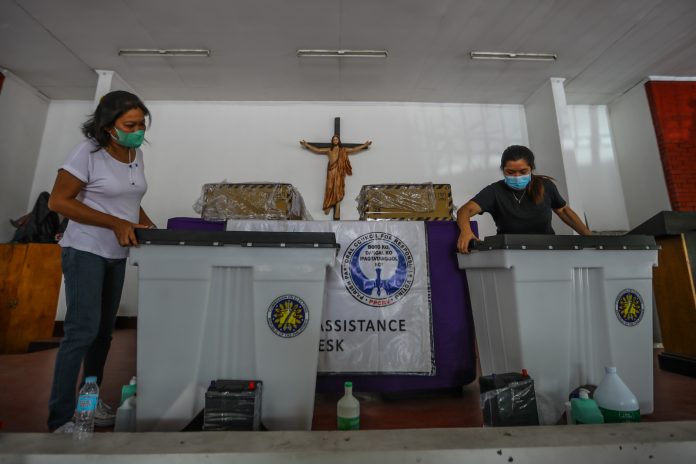Ban Smartmatic from future Philippine elections. That’s what two petitions filed with Comelec seek.
The first compiles evidence of fraud by Smartmatic vote counting machines in Election 2022. TNT (Truth & Transparency) Trio points to an illegal man-in-the-middle.
That router deluged Comelec’s transparency server with 20 million-plus votes for President, VP, and senators on the first hour of counting.
That’s 37 percent of 55.5 million ballots cast, “the fastest tally in Philippine and world history.”
TNT Trio comprises former information-communications technology secretary Eliseo Rio, ex-Comelec commissioner Gus Lagman, and former Finance Executives Institute president Franklin Ysaac.
From “raw files uploaded by a whistleblower” on Comelec’s website, they identified the router. It had a private IP (internet protocol) address 192.168.0.2, a breach of the 2008 Automated Election System Law.
The second petition, nontechnical, is by Leonardo Odoño of the Philippine Military Academy Class 1964. The retired colonel cites two bases to blacklist Smartmatic and bar it from Election 2025 and after that:
• Former Comelec chairman Andres Bautista, presently seeking U.S. political asylum, has been charged by the justice department in Washington D.C. with accepting bribes during his 2015-2017 stint. Four U.S.-based Smartmatic execs will soon be indicted and named for the $4-million (P200-million) money laundering.
• No less than President Bongbong Marcos Jr. had declared that Smartmatic “sells dayaan system, not election system.” That was after he lost the 2016 VP race. Comelec chairman George Garcia was his election lawyer then.
TNT Trio and Odoño worry that Comelec will not afford them their day in court. Since Election 2010 a succession of Comelec chairmen and commissioners had promised fair AES biddings, yet ended up awarding Smartmatic despite loud protests from info-technologists.
In the 2008 bidding, Comelec qualified Tyro Smartmatic against two giant U.S. veteran AES providers.
Chief of staff-lawyer Melchor Magdamo resigned when superiors awarded the Venezuelan firm multi-billion pesos despite its precinct count optical scanner emitting smoke from overheating during a product demo.
Against AES Law, Election 2010 proceeded without source-code review for malware of Smartmatic machines and systems by Filipino info-technologists.
A week before election day, it replaced all 76,000 PCOS SD (secure digital) and the same number of backup cards, unreviewed.
Election 2013 again had Smartmatic as an AES seller. The contract was delayed by a Delaware lawsuit by Dominion Inc. which showed that the Venezuelan didn’t own the software – yet another AES Law violation.
From start to finish, the senatorial count was a fixed 60-30-10 percent trend for administration, opposition, and independent bets. “Impossible, fraudulent,” said UP and Ateneo mathematicians-statisticians.
Smartmatic was first disqualified from Election 2016 on three grounds. Its co-chairman Mark Malloch Brown then visited Malacañang.
Brown was once a PR operator for anti-Marcos forces in 1986, and UN deputy secretary general to the crooked Kofi Annan, from 1997-2006.
Smartmatic’s disqualifications were reversed, former congressman Glenn Chong recounted on Sapol-DWIZ recently. It went on to supply more VCMs, which BBM accused of cheating him.
Election 2019 saw the shutout of all opposition contenders by one independent and 11 admin rivals.
Then, Election 2022 in which Comelec’s transparency server received precinct results even before their printing for poll watchers.
Rio, Lagman, and Ysaac can present only six proofs of such fraud because Comelec ignores their pleas for the release of telcos’ transmission logs from precincts to the Transparency Server.
Garcia inadvertently fueled suspicions of cheating when he disclosed an unusualness only in Aug. 2023: Comelec, through Smartmatic, had procured 20,300 modems supposedly to replace broken ones and accessorize new VCMs for Election 2022.
Garcia made another claim during a Senate hearing Sept. 14. All Greater Manila VCMs precincts supposedly transmitted results via private IP address 192.168.0.2, provided by Globe.
But Rio counters: “Data uploaded in Comelec’s website show that [Garcia] is lying. IP address 192.168.0.2 never appeared on the telco log of Globe in Comelec’s website.” Comelec has gagged Globe, Smart, and Dito since 2022 from talking about precinct transmissions.
Garcia’s revelation also startled Senator Koko Pimentel, former head of the Joint Congressional Oversight Committee on AES: “I’m in shock to find out that our entire election system was one large private network.
“Was [a private gateway] even necessary? Did it not make auditing more difficult because when we backtrack, we stumble upon a telco exchange which, according to experts, could’ve been a device like a laptop with a private IP address.”
Odoño meanwhile was unable to speak when Garcia abruptly ended Comelec’s hearing on anti-Smartmatic petitions two weeks ago. “I wanted to ask two things,” he says:
“One, Mr. Chairman, didn’t you or your Commission get affected at all by those degrading and worrisome [bribery] reports on Smartmatic and chose just to ignore them?
“Two, did you also choose to ignore Mr. Marcos Jr.’s statement about Smartmatic selling dayaan system?”
Comelec gives the impression that it will again favor Smartmatic in Election 2025. For one, it’s shifting from PCOS to a direct-recording electronic system or touchscreen. As well, Garcia is planning to put VCMs in malls on E-Day.
Meaning, that any voter from any precinct can walk into any mall to vote. Meaning, too, that Comelec will dump the senator’s proposal of a hybrid system of manual precinct counting with automated transmission and canvassing.
Jarius Bondoc is an award-winning Filipino journalist and author based in Manila. He writes opinion pieces for The Philippine Star and Pilipino Star Ngayon and hosts a radio program on DWIZ 882 every Saturday. Catch Sapol radio show, Saturdays, 8 to 10 a.m., DWIZ (882-AM).
The views expressed in this article are the opinions of the author and do not necessarily reflect the editorial stance of LiCAS News.









